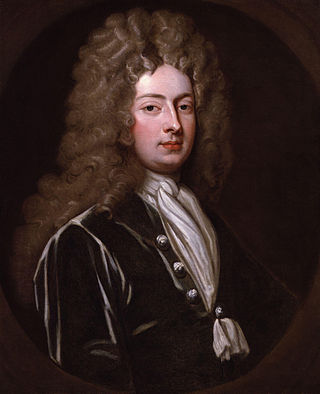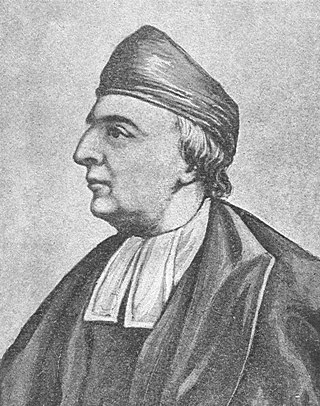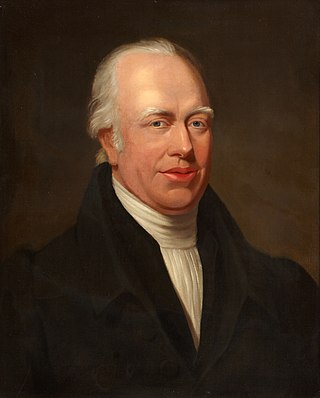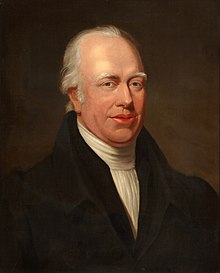
William Congreve was an English playwright, poet and Whig politician. His works, which form an important component of Restoration literature, were known for their use of satire and the comedy of manners genre. Notable plays he wrote include The Old Bachelor (1693), The Double Dealer (1694), Love for Love (1695), The Mourning Bride (1697) and The Way of the World (1700). He died in London, and was buried at the Poets' Corner in Westminster Abbey.
Sir Thomas Duffus Hardy was an English archivist and antiquary, who served as Deputy Keeper of the Public Record Office from 1861 to 1878.
This article contains information about the literary events and publications of 1693.
William Mountfort, English actor and dramatic writer, was the son of a Staffordshire gentleman. He met his death at the hand of notorious brawler Charles Mohun, 4th Baron Mohun of Okehampton, who had just taken part in an attempted kidnap of Mountfort's friend, the actress Anne Bracegirdle.

Thomas Creech was an English translator of classical works, and headmaster of Sherborne School. Creech translated Lucretius into verse in 1682, for which he received a Fellowship at Oxford. He also produced English versions of Manilius, Horace, Theocritus, and other classics.
Charles Gildon, was an English hack writer and translator. He produced biographies, essays, plays, poetry, fictional letters, fables, short stories, and criticism. He is remembered best as a target of Alexander Pope in Pope's Dunciad and his Epistle to Dr. Arbuthnot and as an enemy of Jonathan Swift. Due to Pope's caricature of Gildon as well as the volume and rapidity of his writings, Gildon has become the epitome of the hired pen and literary opportunist.

Jacob Tonson, sometimes referred to as Jacob Tonson the Elder, was an eighteenth-century English bookseller and publisher.

Samuel Wesley was a clergyman of the Church of England, a poet, and a writer. He was the father of John Wesley and Charles Wesley, the founders of Methodism.

Adam Clarke was a British Methodist theologian who served three times as President of the Wesleyan Methodist Conference. A biblical scholar, he published an influential Bible commentary among other works. He was a Wesleyan.

William Walsh of Abberley Hall, Worcestershire was an English poet and critic and a Whig politician who sat in the English and British House of Commons from 1698 to 1708.
Charles Blount was an English deist and philosopher who published several anonymous essays critical of the existing English order.
Fables, Ancient and Modern is a collection of translations of classical and medieval poetry by John Dryden interspersed with some of his own works. Published in March 1700, it was his last and one of his greatest works. Dryden died two months later.
Richard Duke was an English clergyman and poet, associated with the Tory writers of the Restoration era.
Nationality words link to articles with information on the nation's poetry or literature.
Nationality words link to articles with information on the nation's poetry or literature.
Nationality words link to articles with information on the nation's poetry or literature.
Nationality words link to articles with information on the nation's poetry or literature.
Temple Stanyan (1675–1752) was an English civil servant, politician and author. He is most known for his Grecian History, first published in 1707, which became a standard work on the history of ancient Greece in the early part of the 18th century.
Awnsham Churchill (1658–1728), of the Black Swan, Paternoster Row, London and Henbury, Dorset, was an English bookseller and radical Whig politician who sat in the English and British House of Commons from 1705 to 1710.
John Potenger or Pottinger (1647–1733) was an English legal official and author. He was educated at Winchester School and Corpus Christi College, Oxford, and proceeded B.A. in 1668. He was admitted to the Inner Temple in 1675. He obtained the post of master in chancery after 1678, and subsequently sold it. He was removed from public office for refusing to support the religious policy of James II, but was restored by William III. He was the author of A Pastoral Reflection on Death, several translations, and many unpublished poems.










